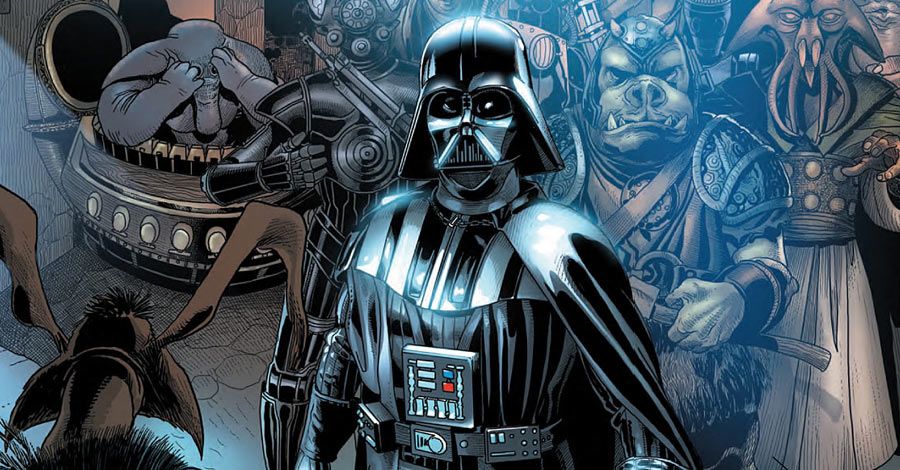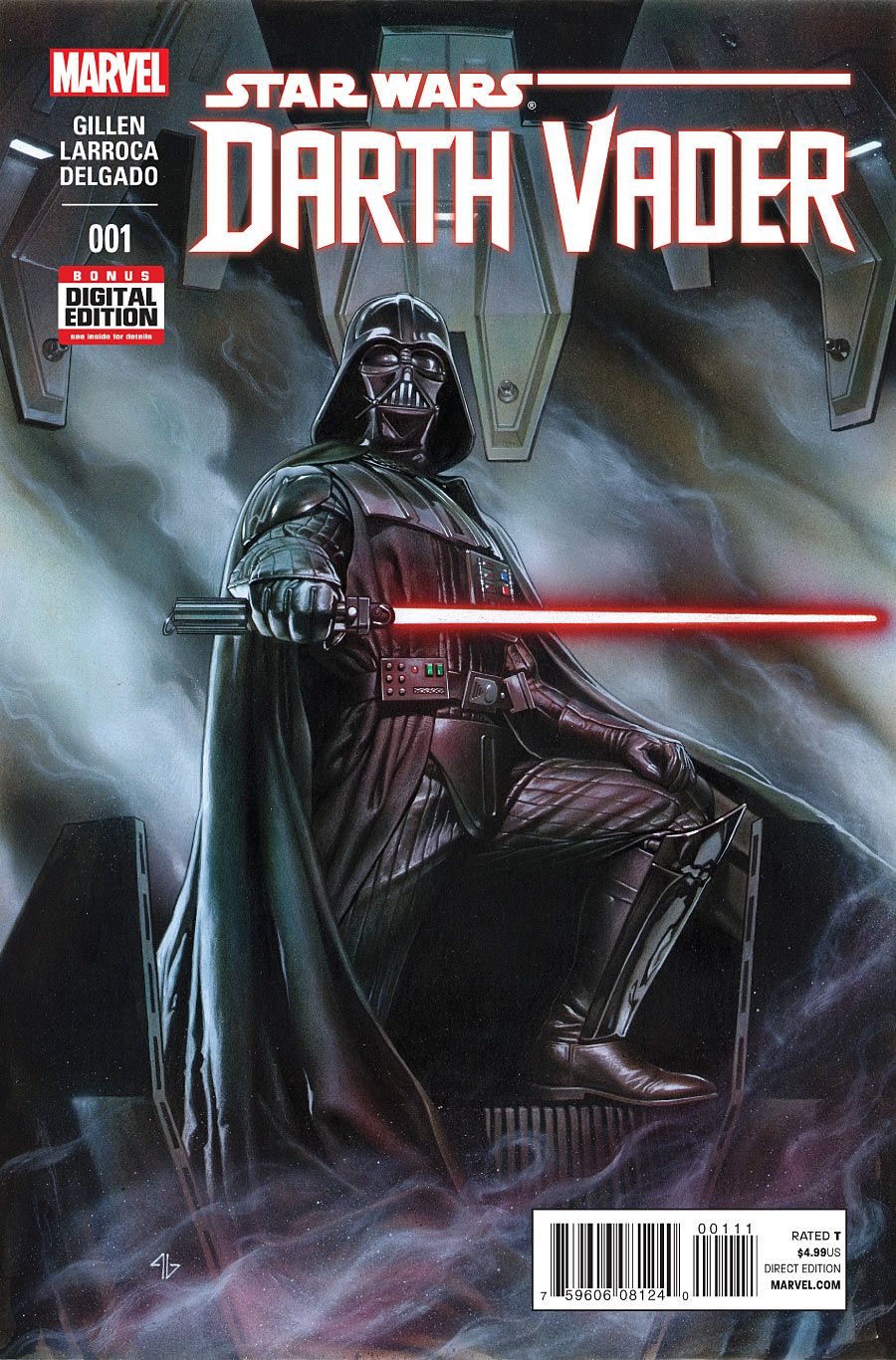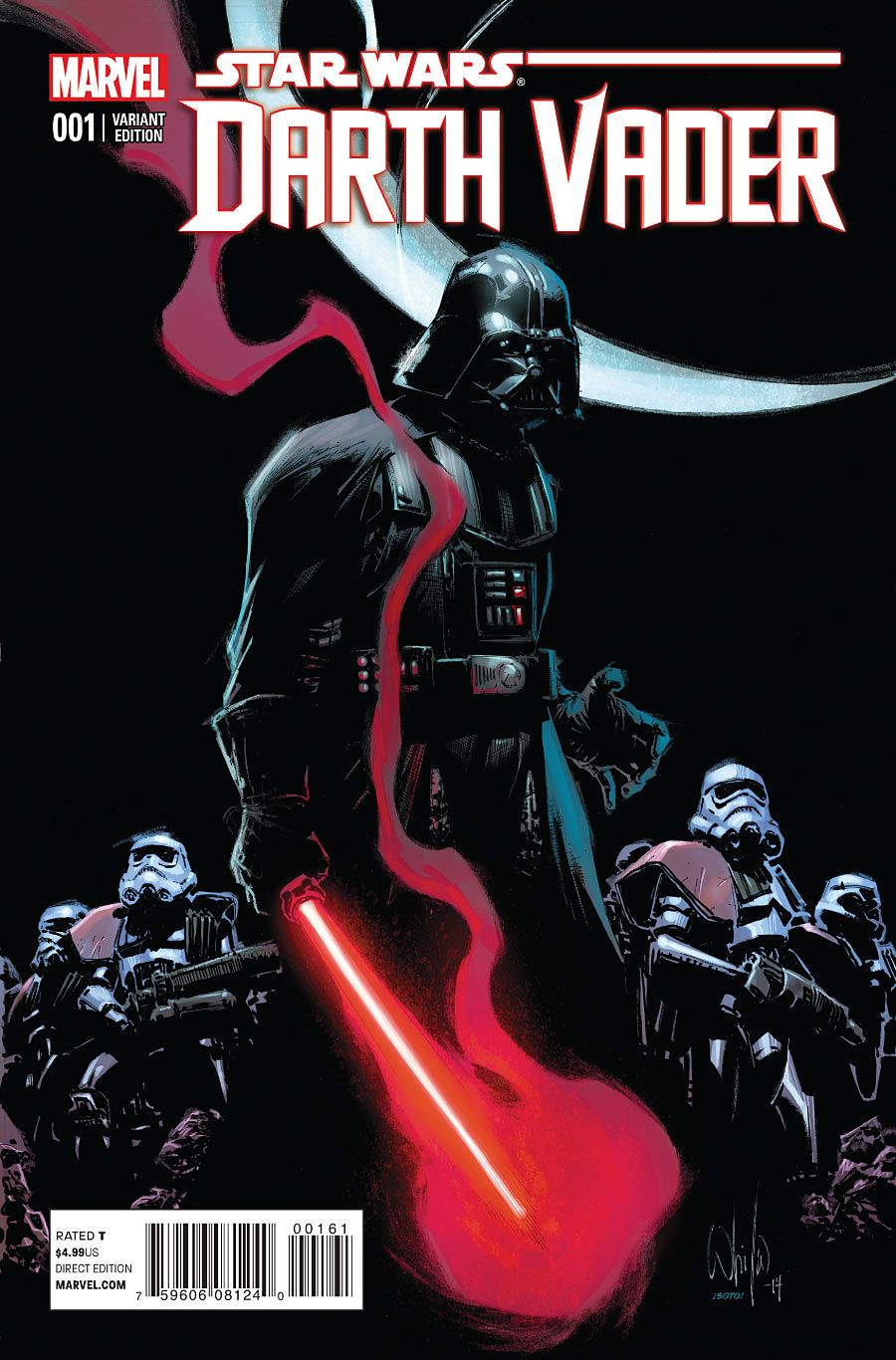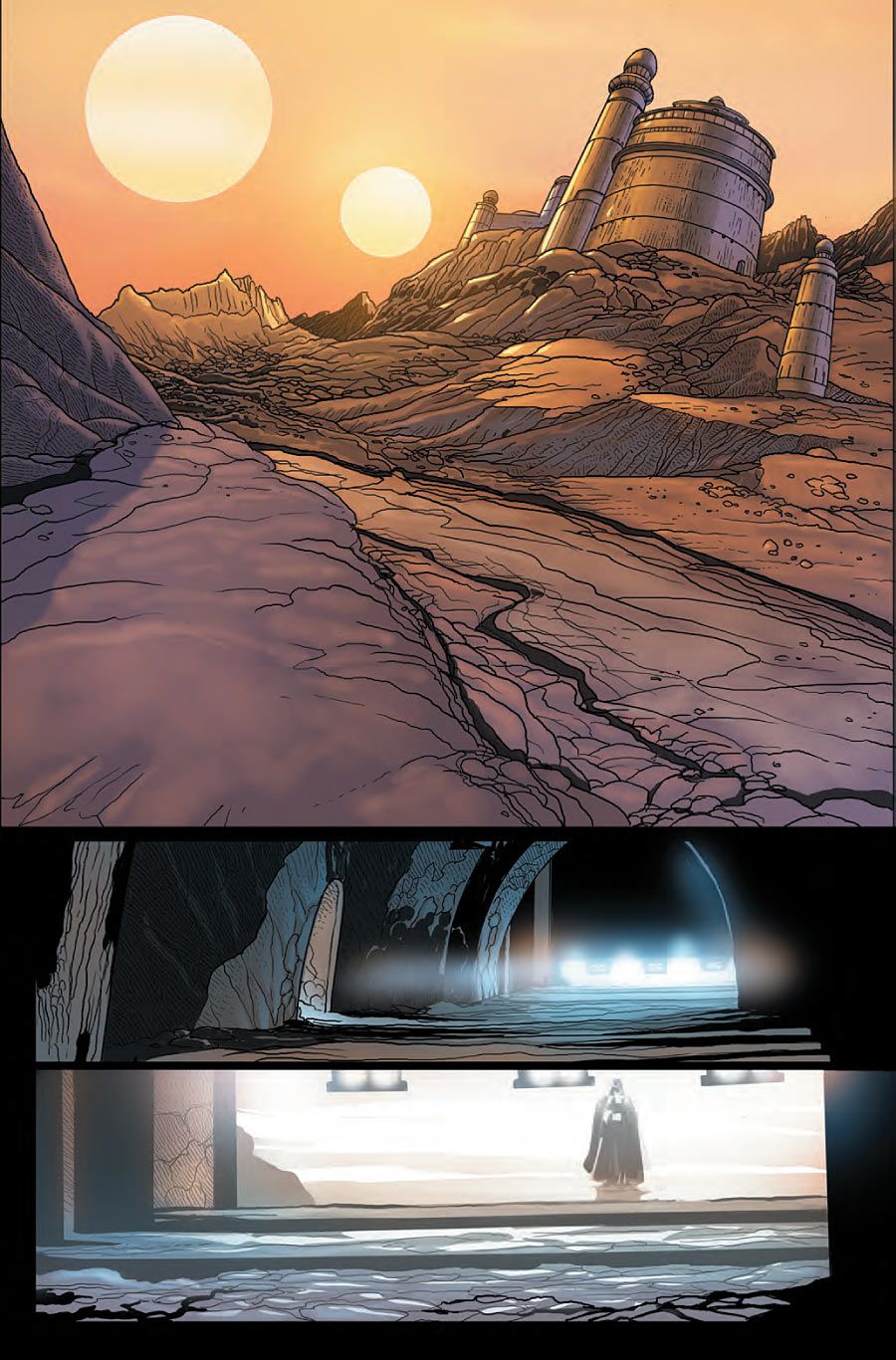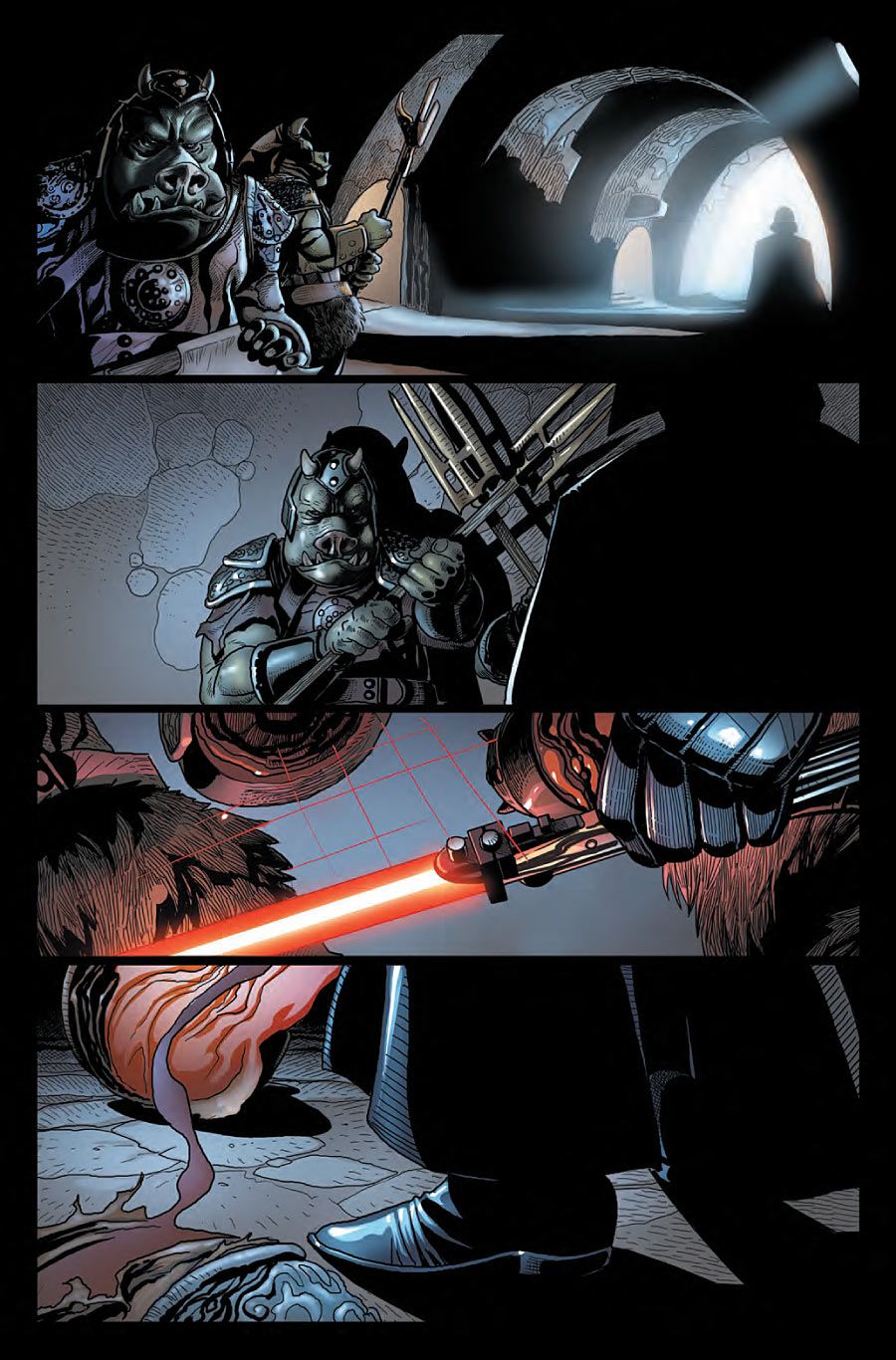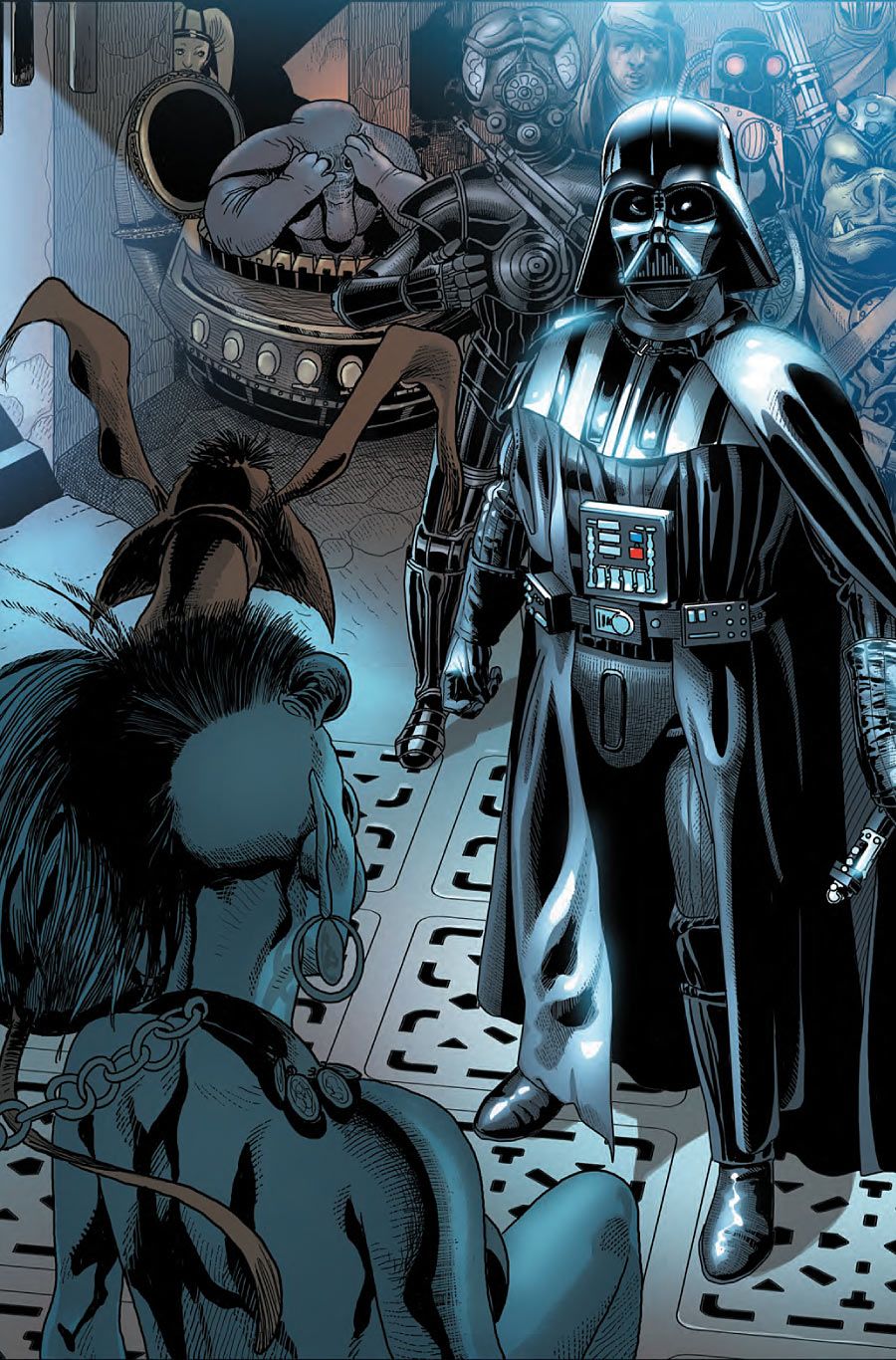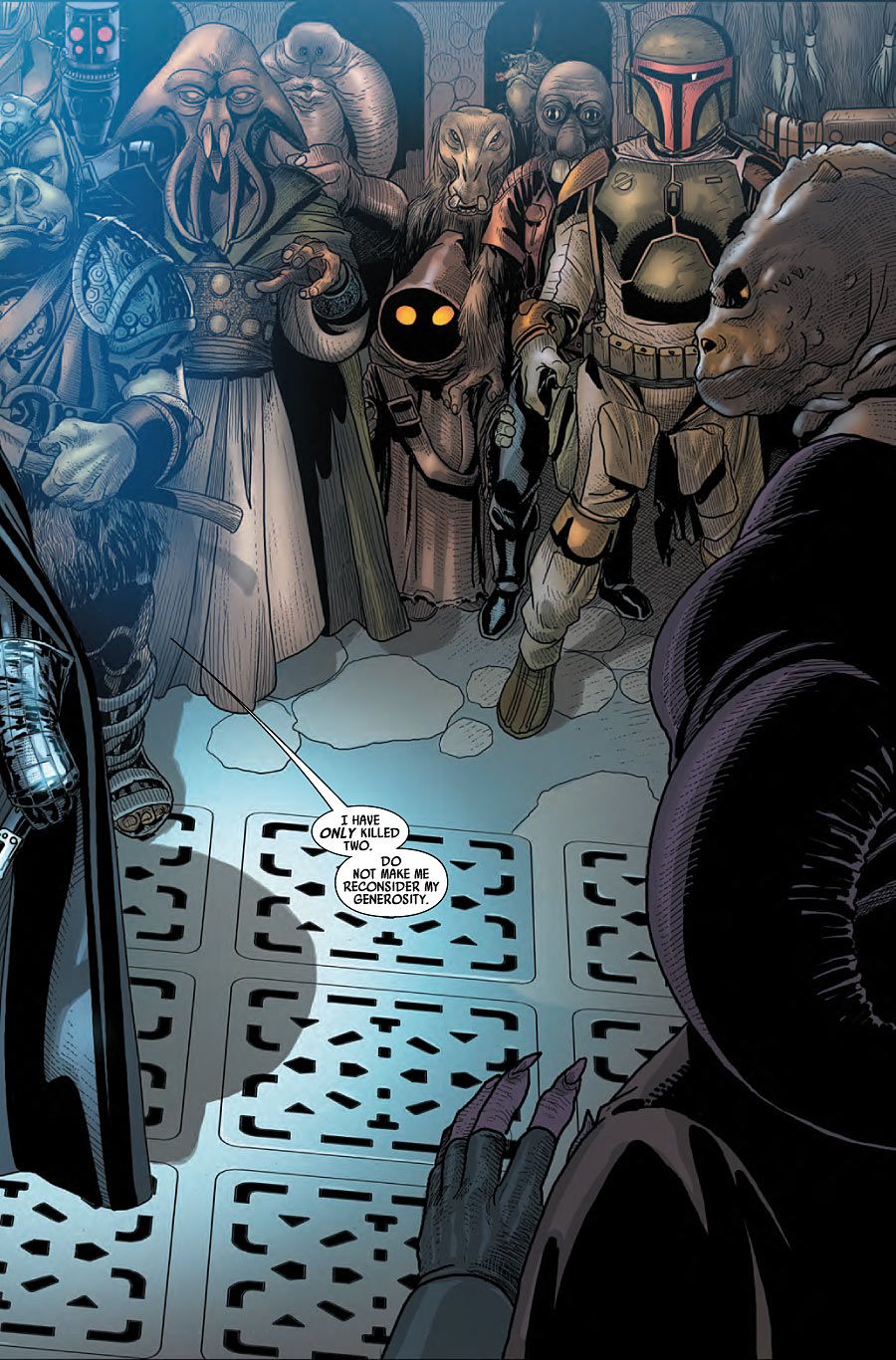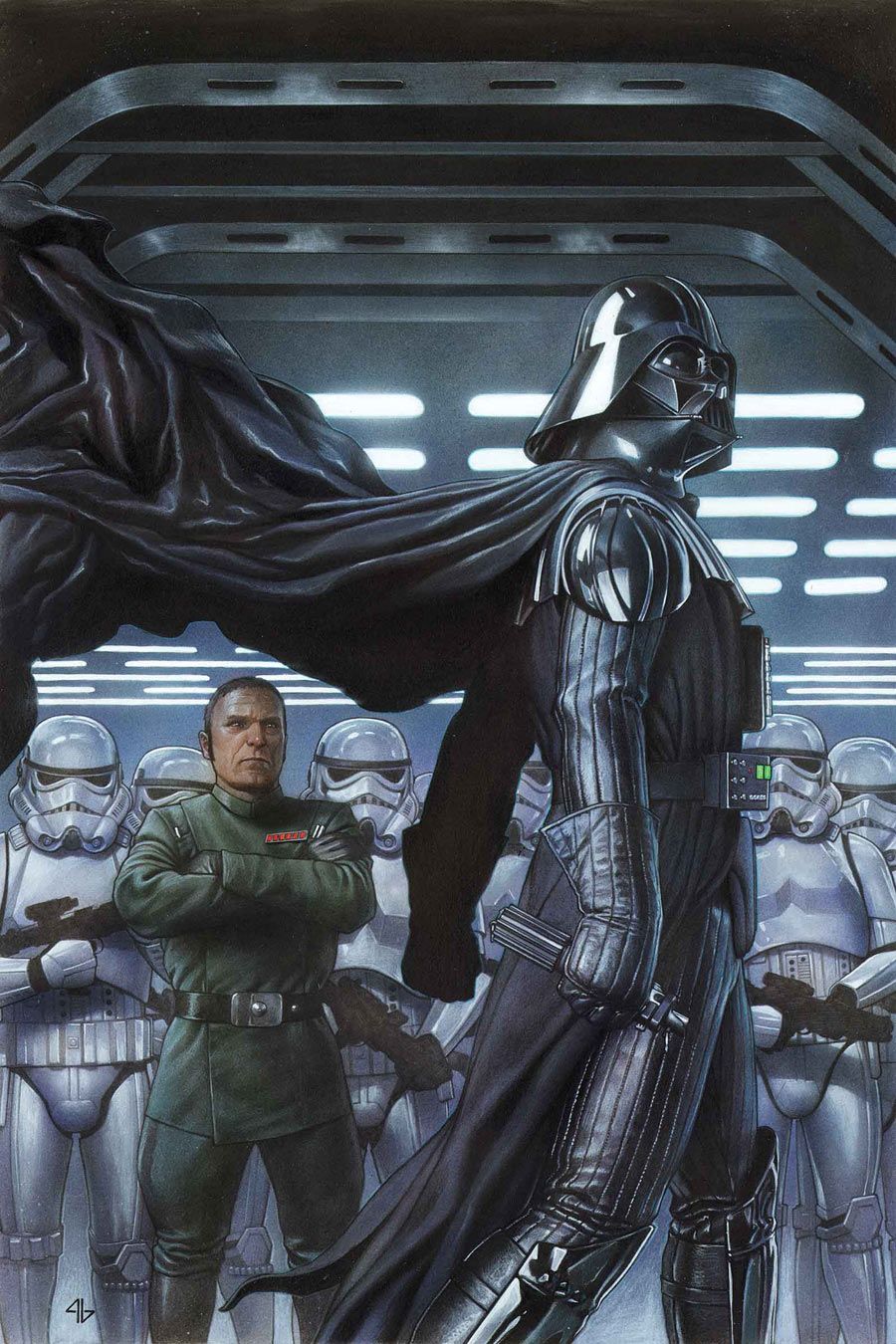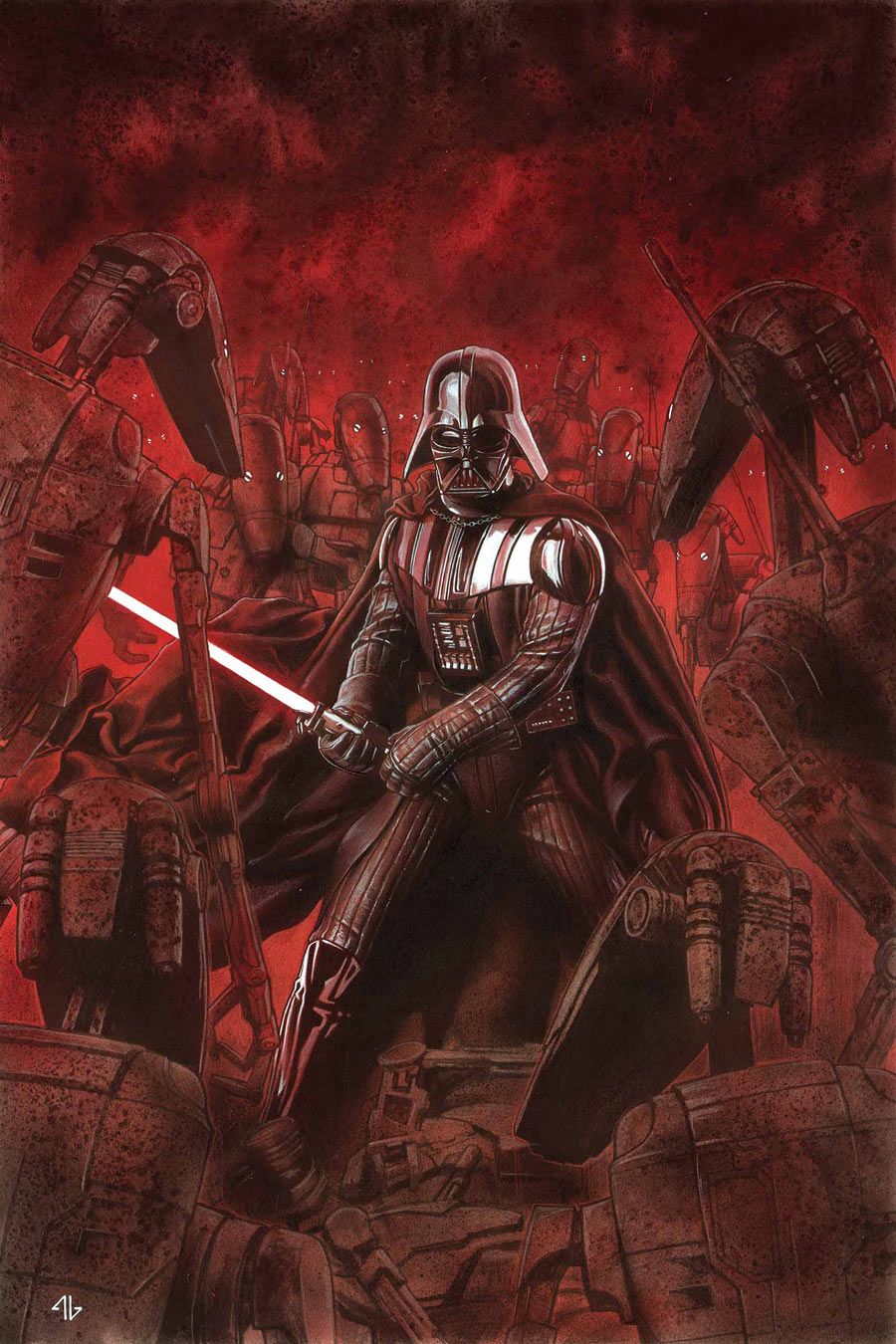Kieron Gillen isn't messing around with arguably the greatest villain in cinematic history. The British writer knows full well that the titular antagonist of his new Marvel Comics series "Darth Vader" has a complicated history but he's not planning on any revisionist history just because readers know how Anakin Skywalker's story begins and ends in "Star Wars."
Darth Vader is a badass and you don't want to be in the same room as him even if you are one of his business associates from a long time ago in a galaxy far, far away. Just ask Boba Fett or Jabba the Hutt, the iconic gangster that was introduced as a supporting character last week in "Darth Vader" #1, which was illustrated marvelously by Salvador Larroca.
SDCC: Gillen Explores the Dark Side in "Star Wars: Darth Vader"
The new series is set between "A New Hope" and "The Empire Strikes Back" and Gillen confirmed that readers will see many favorites like Emperor Palpatine and Cassio Tagge in the months and years ahead, as well as new characters like the new Wookiee bounty hunter named Black Krrsantan, also introduced in "Darth Vader" #1.
Gillen also shared details on how "Darth Vader" will interconnect with "Star Wars," the new series written by Jason Aaron, and why villain-protagonists like Walter White, Frank Underwood and Vito Corleone are just as much a part of Vader's DNA as Shmi Skywalker-Lars and an exceptionally high count of midi-chlorians.
CBR News: In the first issue, I found myself rooting for Darth Vader, most certainly in the pages and panels opposite Emperor Palapatine. Is Vader the hero in this series?
Kieron Gillen: The classic line is that everyone is the hero of their own story. You make up all kinds of stories in your head to justify what you're doing. But for me, I'm very much fine seeing him being a villain. It's over 20 years on and he's still serving the Emperor. But he's definitely the protagonist. It's like "The Godfather." It's like "House of Cards." It's like "Breaking Bad."
It's an interesting story. In the first six movies, Anakin is the throughline. And I get to continue that story. We know he's a villain but we also know where he ends up. And as we get further into the book, we will see him surrounded by people worse than him. Palpatine is an amazing villain. Writing Vader and Palpatine is fascinating because of all of the games going on. And in the next issue, we meet Tagge. And he has an entirely different view of how the Empire should act. And we have the unknown individual who is in the first issue and not named. He's got his own philosophy on how the Empire should act too.
It's almost like a classic superhero comic. These are all dark mirrors of the hero. Vader does some things that we would define as indefensible. There is a good line in "Story" by Robert McKee about "The Godfather," which basically says that "The Godfather" works because there are other godfathers that are more questionably ethical and worse than him. It's like saying, "If I was an organized crime lord that killed loads of people, that's the kind of organized crime lord that I would be." [Laughs] Without a doubt, this is a villain-protagonist book. I wouldn't say anti-hero.
REVIEW: Gillen and Larroca's "Darth Vader" #1 "Shows Darth Vader at His Worst"
You mentioned that readers know how Darth Vader's story ends. How much does that fact play into your storytelling?
There is certainly room for dramatic irony. It's basic literary devices. "Macbeth" is just as good the second time you watch it performed. [Laughs] And part of the tragedy is that you know where it ends. It's how you go there and how it delineates. You see all of the mistakes that people make and all of the times that they don't learn from those mistakes. Without a doubt [Laughs], the vast majority of people reading "Darth Vader" know how it ends. And that's fine. This book is more about how did he get there?
That was the most exciting thing about doing this book, especially in the period that we're doing between "New Hope" and "Empire." In "New Hope," Vader is not quite as politically powerful as he is going to become. The Empire is an entire fleet and he's basically a field commander. In "A New Hope," he's almost like a troubleshooter. And he becomes enormously more powerful between the two movies. Why? Especially, when you consider that Vader really is to blame for the destruction of the Death Star. At least, he's the only one left alive that the Emperor can blame. [Laughs]
There's an interesting story in the lead up too. Vader has basically been in a holding pattern for 20 years under the Emperor's control and then along comes Luke. And he's shortly going to discover something that he didn't know but has been beginning to expect. And that's going to completely change everything. And that's what makes it all quite fascinating. It's a bad time for the Emperor to choose to start treating Vader badly. [Laughs]
There are a lot moving parts and there are lots of characters with different ideas -- who wins, who loses and how do they lose? It's all in there. In "Titanic," you know the ship sinks. [Laughs] But how it got to the bottom is the interesting thing.
Vader, the Emperor, Boba Fett, Jabba the Hutt -- obviously these villains all have speaking roles in the movies, but certainly not at the level of dialogue in "Darth Vader" #1. How did you go about finding distinct villainous voices for each of these characters? It reminds me of the Legion of Doom from "Super Friends" or Spidey's Sinister Six.
Vader is easy. Look at the first line that Vader says to Jabba: "Don't make me question my generosity." [Laughs] When I wrote that line, it was one of the first things that I wrote for the book. And I knew right away that it was definitely Darth Vader. Vader has such a powerful voice. And when you are writing dialogue for these characters, you quickly realize why they are as iconic as they are.
For Jabba, you kind go from third person and he's translated so you don't really get a sense of voice. You have to look at the phrasing he uses or more importantly, how he acts. What's his motivation?
Boba Fett is the hard one. That's something that Jason and I absolutely agree on. In our comics, there are now more Boba Fett speaking lines than there are in the movies. Every time that I write a Boba Fett line, I feel wrong. [Laughs] And I am always cutting his lines. He's an action star. He's much more about how he acts and what he chooses to do. That's the best way to express what he is feeling. He has a bigger part in the second arc than the first arc. He's going to be heading out after Luke, and that will probably be a bigger part in "Star Wars" than "Darth Vader" in the first arc but he plays a big part in my book as well.
Do you channel James Earl Jones while scripting Vader by watching and re-watching the movies? Or maybe listen to "Imperial March" on repeat?
I do a playlist for all of my books. And that was the joke. For "Darth Vader," you listen to "Imperial March" 20 times. [Laughs] But in all seriousness, I have listened to it more than you might think.
[Editor's note: Listen to Kieron Gillen's 'Darth Vader" playlist here.]
The first things that I did when I got the job were sitting down with a note pad and watching all of the movies back-to-back. I did a full-on re-indoctrination. And occasionally, when working on certain scenes, I put "Star Wars" on and have a close watch. My wife is an enormous "Star Wars" fan, so there is no problem in the house when I say, "I just want to watch five minutes of 'Star Wars' because I want to see how he does this." [Laughs]
And like Boba, I am always cutting his lines. The first draft always has more dialogue than it needs and I just lose the lot. And as we start to build Vader's supporting cast, he gets even quieter. Because when he has a supporting cast, he doesn't have to say as much. It's quite important to me that you never really know exactly what Vader is thinking. And that's the purpose of the one-panel flashbacks. A big part of the book is keeping Vader as this enigmatic, powerful thing -- you don't want to reduce him. You want to be scared to be in the same room as him.
You have to have threats against Vader without Vader appearing weak. In the first issue, Vader gets an ear-lashing from Palpatine. He's like the worst, [most] domineering boss of all-time. At the same time, you already see that Vader's not really going to put up with that.
And it can't be written like an episode of "The Office," right?
[Laughs] Yes, exactly. Eventually, it's going to be like "West Wing." Vader will be doing a walk-and-talk. And Vader is very good at walking. That's the main thing that I have realized writing the books so far. At least once an issue, Vader walks while looking cool.
You've written a lot of villain-protagonists during your career, most recently with the likes of Loki and Magneto for Marvel. Is Vader like a supervillain or is it a different animal when the Force is with you?
Every villain and every hero is their own self. A Darth Vader comic is a very different thing than a Loki comic. Vader is brute force, even when he's being cunning. In the second issue, you will see how he circumvents a problem. You have to ask yourself, what would this character do in this situation?
And this might sound banal or even stupid but I really want the book to sound like "Star Wars." This is not a comic book adaptation but it has to feel like "Star Wars." I think that's why people enjoy Jason's book as much as they do. It feels like "Star Wars." But my book is slightly different because it's the bad guys from "Star Wars" but I still want it to feel "Star Wars"-y. You can't just have a bunch of Stormtroopers because it would be too faceless. They are basically faceless bad guys. You have to start inserting aspects of "Star Wars" -- elements like comedy. And it's not like Darth Vader is going to start doing stand-up comedy. [Laughs] But there are lines or beats that sound like "Star Wars." I've always thought of Vader as an underdog in this period. And I want that to come through too. Fighting against more powerful enemies is absolutely Star Wars.
It's tricky. Without a doubt, he's the bad guy. But you're very interested in watching him. I know it's my own book but when I'm writing him, I will say to myself, "That's an interesting move, Darth Vader." [Laughs] As a character, he's constantly surprising me. There is a scene in "Darth Vader" #4 that really surprised me.
Marvel's "Darth Vader" #1 Hits 300k in Pre-Orders
Something that really surprised me at the end of "Darth Vader" #1 was the Wookiee that we see riding shotgun with Boba Fett. He's a new character, right?
Yes. And he's cheerfully enigmatic, isn't he? [Laughs] Black Krrsantan is a bounty hunter. And he's typical of what's to come. We'll be seeing lots of classic characters but we'll be populating the galaxy too. It's always a bit odd if just the same characters turn up. It's a really big galaxy. As for Black Krrsantan, he's obviously a Wookiee. And he's also pretty obviously, not a very nice Wookiee. [Laughs] It looks like he has bits of hair missing. And there are some burn marks. There is an implied story there. And as we get further down the line, we will see more and more of organized crime in the Star Wars universe -- lots of the bounty hunters that you know. And lots that you don't. It lends itself to this kind of roguish element. These are the sorts of people that Vader would talk to.
And how do you pronounce Krrsantan?
Krr-san-tan. I actually regret calling him Black Krrsantan. It's awfully hard to say. [Laughs] He'll have a nickname, at some point, I am sure. It will be very much like Chewbacca and Chewy.
You mentioned the interconnection between "Darth Vader" and Jason's "Star Wars." Are you in constant contact with him about charting the two books? And how involved has the Lucasfilm Story Group been in the process?
Jason and I have a great relationship. I was writing "Uncanny X-Men" when he was writing "X-Men" so we have experience writing two books that are running parallel. They have their own stories but there are soft connections. My story starts shortly after his and then we go our own way and then we come back again. But as is always the case with my books, you only have to read mine to follow the story but if you read both, we will reward you.
Jason and I were actually just in San Francisco last week meeting with the Lucasfilm Story Group. We are already planning next year's story. Where will we go after this year, heading into next year? We're doing a big story and now we're plotting what comes out of the big story. I'm introducing a lot of new characters and Jason is introducing a lot of new characters. And I'll be using some of his characters and he'll be using some of mine. It's almost more fun than working in the Marvel Universe because there are only a few of us working on these books. That means there are fewer toys to worry about.
The Lucasfilm Story Group is basically a curator. They're keeping the "Star Wars" canon very, very tight. They're very receptive to new ideas and they're also very good at sharing what's happening elsewhere outside of the comics. We know some big things that are coming and we can work with those too. If you are a big "Star Wars" fan and you follow the books and the comics and the TV series and the movies, you will be rewarded.
It sounds like you are locked into "Darth Vader" for the long haul. How far along are you in the writing process?
I actually finished writing "Darth Vader" #6 last week. I wanted to have the first arc written before anyone had read the first issue so there was no chance, at all, of me being warped by the response.
Finally, you're a gamer and a former gaming journalist. Did you ever play any "Star Wars" games, and if so, do you have any favorites?
Wow. I actually haven't played that many "Star Wars" games over the last few years but certainly "Knights of the Old Republic" was an outstanding game -- a real achievement, both as a "Star Wars" game and in gaming history. It's important historically as it's on the edge of the hallowed period of "Star Wars" games and that's going back to the mid-1990s and the high LucasArts period. You get "X-Wing" and "TIE Fighter." "TIE Fighter," especially, is a tour de force. It was an amazing, astounding thing. All of the "Jedi Knight" games are fascinating but yes, "Knights of the Old Republic" is probably my favorite. That game really made me fall back in love with "Star Wars," despite being thousands of years before the real story.
"Darth Vader" #1 by Kieron Gillen and Salvador Larroca is available now.

